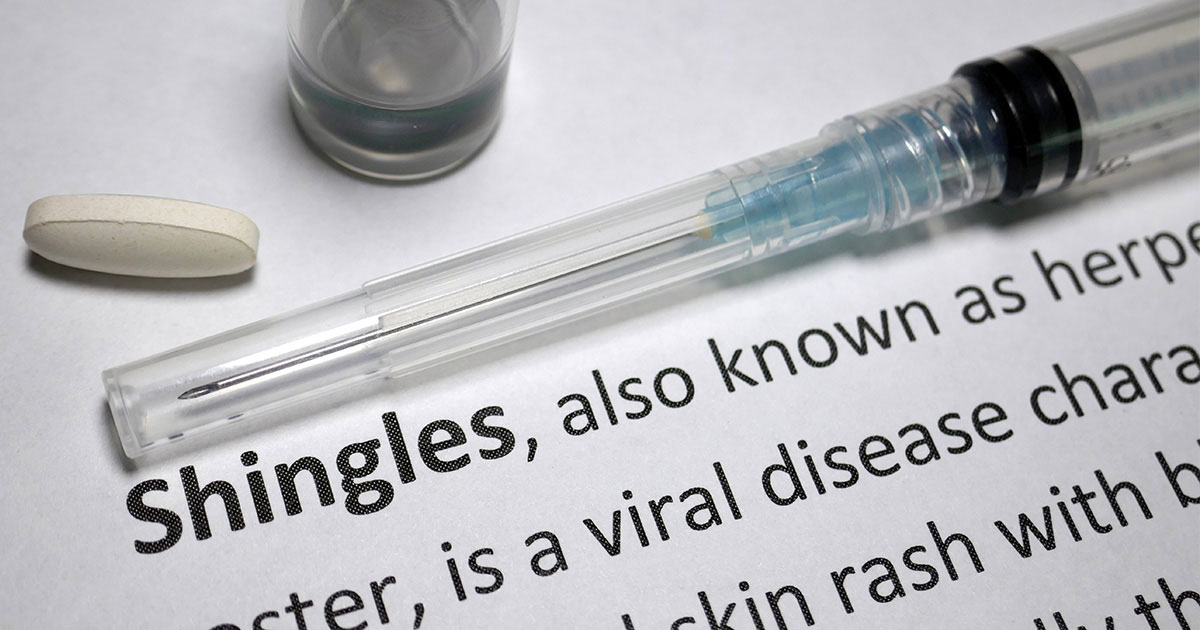What are the symptoms of shingles?
Most people have an outbreak of rash or blisters on their skin. Usually the rash/blisters are isolated to a single area of your body and it almost always occurs only on one side of the body or face. Early signs of shingles may include a burning or shooting pain, tingling, or itching. Often, one will have these early symptoms up to 2 weeks before the rash starts. The pain can be mild to severe. The blisters typically scab over in 7 to 10 days. In rare cases, the rash may be more widespread and look similar to a chickenpox rash. Rarely, people will also develop a fever, headache, chills, or upset stomach, as well.1
Why does shingles occur?
It is caused by the varicella-zoster virus, the same virus that causes chickenpox. After you have chickenpox, the virus stays in your body. As you get older, the virus may reappear as shingles. The virus attacks the nerves under the skin and is why it can be so painful. It is possible, but rare for people to get shingles more than once.1
Who is at risk for shingles and is it contagious?
Anyone who has a history of having chickenpox can get shingles. However, the risk goes up as you get older. Those over 50 are most at risk. Transmission of shingles to another person is very rare in people with normal immune systems. If you have shingles, you should stay away from anyone who has not had chickenpox or has not been vaccinated, as well as those who have weakened immune systems (immunocompromised) or pregnant. Certain diseases, cancers, immunosuppressive medications, and even stress or a recent infection can lower your immune system. Most children are vaccinated with their first chickenpox (varicella) vaccination at age 12-15 months, so before this age they would be vulnerable to contracting the virus if exposed to shingles. If a pregnant woman gets chickenpox (which she can get from being exposed to shingles) for the first time during pregnancy it can lead to severe congenital defects in the fetus. Luckily most women have already had chickenpox as a child, but for those who haven’t it can be devastating. There is very low risk to a fetus of a women who has already had chickenpox but it is still recommended to not have contact with those with chickenpox or shingles during pregnancy if possible.2
What are the complications of shingles?
Some people are left with nerve pain that can last weeks or even years. Vision loss can occur if it affects your eye. Hearing or balance issues are possible if it is in or close to your ear. Muscle weakness can occur and be temporary or permanent. Very rarely shingles can also cause pneumonia, brain inflammation, or death.2

How is shingles diagnosed?
Your health care provider can scrape some of the fluid from your shingles blisters and have it tested for shingles, but this is rarely needed. Usually providers can diagnosis you by just examining the rash.1
What are the treatments for shingles?
There is no cure for shingles. Antiviral medicines may help to make the attack shorter and less severe. They may also help prevent the nerve pain. The medicines are most effective if you can take them within 3 days after the rash appears. So, if you think you might have shingles, contact your health care provider as soon as possible. Pain relievers such as Tylenol and Ibuprofen may also help with the pain. A cool washcloth, calamine lotion, and oatmeal baths may help relieve some of the itching. If nerve pain ensues, one can speak with their physician about other medication that may help relieve some of the pain.1
Can shingles be prevented?
There are two vaccines to prevent shingles or lessen its effects. The Shingrix vaccination became available in 2017 and is now the recommended vaccination to receive. It is more than 90% effective in preventing shingles. It requires two doses. The second is given 2-6 months after the first one. The Centers for Disease Control and Prevention recommends that healthy adults 50 years and older get the Shingrix vaccine. Many people have already been vaccinated with the Zostavax vaccine that has been available since 2006. However, since the Shingrix has been found to be so much more effective at preventing shingles, it is recommended that anyone that had the Zostavax be also vaccinated with the two doses as Shingrix. Zostavax is now only indicated for those over 60 who may be allergic to Shingrix, prefers Zostavax, or Shingrix is unavailable.3
©2022HealthSpot References: (1) Medline Plus. Shingles. https://medlineplus.gov/shingles.html (December, 2018). (2) Up To Date. Epidemiology, clinical manifestations, and diagnosis of herpes zoster. (2019). (3) U.S. Department of Health and Human Services. Physical activity guidelines advisory committee report. Washington, DC: U.S. Department of Health and Human Services; 2008.

